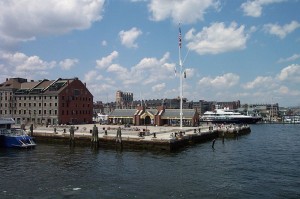Saving Boston's Long Wharf Park From Extinction
Have you visited the beautiful and historic Long Wharf Park on Boston Harbor? And what do you do when the government goes rogue?

Area of Long Wharf to be leased to the private restaurateur. The covered shade structure will be enclosed and expanded for the private restaurant and bar, and a fenced private outdoor dining area will extend into the plaza. (Photo: Chris Wood via Wikimedia Commons)
The Boston Redevelopment Authority (BRA), in defiance of the Massachusetts Constitution, is trying to turn Long Wharf Park into a late-night restaurant and bar. The Massachusetts Constitution requires a two-thirds vote of the Legislature before public parkland can be converted to other uses. The vote has not happened, and the BRA is telling the world that it is unneeded. As featured in today’s Boston Globe, ten local residents, including me, have been trying to force the government to obey the constitution.
The constitutional provision, Article 97, was passed by referendum of the citizens of Massachusetts in November 1972. It was a time of social progress. The public, outraged by the polluted Cuyahoga River’s catching fire, inspired by Rachel Carson‘s Silent Spring, and building on widespread questioning of institutions, asked, “How can we improve our environment and make our planet fit to live in?”
Richard Nixon, our last liberal president, expanded the Clean Air Act (1970) and signed the Clean Water Act (1972) — which provided the legal basis for the lawsuits forcing a court-ordered cleanup of Boston Harbor. This publicly funded cleanup makes the Boston waterfront such a beautiful, and contested, place today. (For the legal history of the cleanup lawsuits, see this law-review article.)
Constitutional government is a recent invention, not lightly discarded. Even the Magna Carta, forced upon King John by the barons of 13th century England, was not as innovative. It confirmed only that the barons themselves would be part of government and could check the absolute power of the king. But who checked the power of the government (the barons)? The idea that the people would subject the government to law – the innovation of constitutional government — was the great invention of the American colonists.
But if the price of liberty is eternal vigilance, it does not come cheap. For four years we have fought in court. Four among us are lawyers, and I’m a physicist with a good memory (which only partly compensates for lack of legal expertise). Over countless evenings and weekends researching the law and the history in order to write legal briefs, we have put in about 2000 hours of sweat equity. At the rate of an inexpensive lawyer, say, $200 per hour, that’s equivalent to almost half a million dollars in legal costs. In contrast, the BRA pays its outside-counsel law partners with public money.
But three years into the case, the Superior Court judge ruled in our favor and saved Long Wharf Park from extinction. The BRA has appealed to the Massachusetts Supreme Court. The case Sanjoy Mahajan et. al. v. Department of Environmental Protection and BRA will determine the fate of Long Wharf Park and all other parks created through urban renewal, anywhere in Massachusetts. With the stakes so high, we retained New England’s most experienced environmental law firm. (Here is the legal-defense fund.)
The Supreme Judicial Court will hear oral arguments from both sides on the morning of Mon., Nov. 5, sometime between 9am and 1pm. It is a public proceeding and you are invited to attend, in person or by webcast, and see constitutional government in action.

Comments